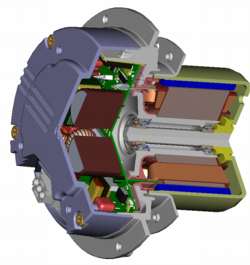The synergy of EC motors and FCUs

Electronically commutated motors can be connected direct to AC mains and have little more than half the power consumption of standard AC motors.
Electronically commutated motors provide clear advantages over AC or conventional DC motors in terms of service life, controllability, flexibility, and cost-effectiveness explains CIVE PALFREY. For the past 30 years, forward-bladed centrifugal fans in fan coil-units have been driven by AC motors, which are typically around 45% efficient. However, the latest electronically commutated (EC) motors are 80% efficient, leading to significant operational benefits. The term EC is applied to a DC motor having electronic commutation achieved with a microprocessor. Commutation means applying a current to the motor phases to produce the best torque at the motor’s shaft. In brush-type motors, commutation is done electromechanically using graphite brushes and a commutator. In brushless motors, however, it is achieved by switching electronics using rotor-position information obtained by sensors. Thus, the EC motor is essentially a DC motor that can be connected direct to an AC mains supply. The EC motor used in Trox fan-coil units, for example, comprises an external-rotor motor having a permanent magnet with integrated electronics. It works in the same way as a brushless DC motor.. EC motor technology has been proved in many applications during the last five years. However, its application in fan coils is relatively novel.
Higher efficiency The major advantage of EC motors over their AC counterparts is far higher efficiency, which enables a fan-coil unit to achieve a specific fan power (SFP) of 0.3 compared with 0.8 for an AC motor (the limit in the latest Building Regulations is 0.8 W/l/s). This higher efficiency can be maintained at low speeds, so less motor heat is absorbed by the cold air discharged from the FCU, which in turn leads to more cooling applied in the space. Lower temperatures increase motor life, and in-built soft starting gives longer bearing life. Speed control is simple, and results in impressive energy saving performance. The maximum cooling load on an FCU may only apply for 500 h out of a total annual running time of 3,000 h. With a typical fan coil unit, the fans deliver more air than necessary for 2500 h/year — a shocking waste of energy. By using the temperature controller on an FCU to reduce the speed of the EC motor during periods of reduced cooling demand, you can cut energy wastage dramatically. For example, an annual fan energy consumption of 620 kWh can be reduced to 140 kWh using speed control. The reduction of air volume is, however, limited by considerations of the room air distribution. That is why we recommend that tests are undertaken in a suitable test facility to determine the optimum range of air volume.
Optimised By using ceiling diffusers with suitable volume turndown characteristics, the air movement in the space can be optimised to ensure comfortable conditions throughout the turndown range. Our tests indicate that a lower volume of 70% is possible, which results in the fan power being reduced by 50%. There is also less room noise as a result of the lower air volumes handled. The pressure generated by an FCU is directly related to the amount of energy consumed. By reducing the external pressure-drop in a system and the internal losses of the FCUs, it will be possible in the future to ensure that such systems meet lower energy limits when combined with high-efficiency motors. For example, the stepless volume control possible with EC motors many make balancing dampers in the downstream ductwork unnecessary.
Energy saving The availability of EC motor technology will enable FCU manufacturers to work with motor manufacturers to develop further energy-saving solutions, particularly important in today’s environmentally-conscious world.
Electronically commutated motors offer six major benefits when used in fan-coil units. • High efficiency of 85%, leading to lower input power.
• Lower rise in air temperature on the air stream.
• Efficient speed control.
• Longer motor life resulting from lower running temperatures.
• Longer bearing life because of the soft-start feature.
• Suitable for a 230 V supply.
Clive Palfrey is technical director with Trox (UK) Ltd, Caxton Way, Thetford IP24 3SQ.
Related links:








